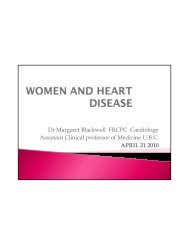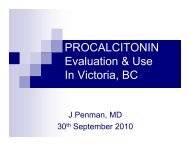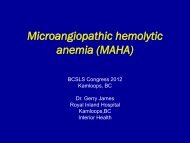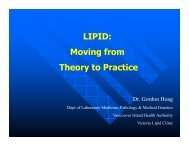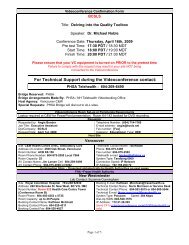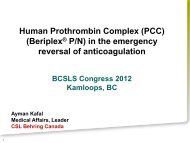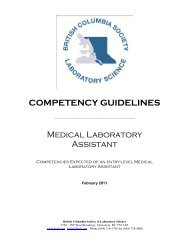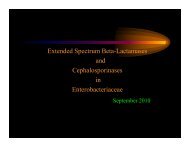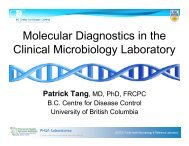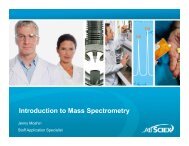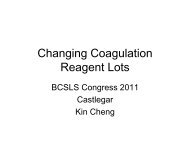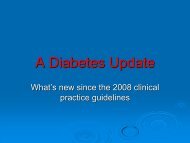BACK TO THE BASICS
BACK TO THE BASICS
BACK TO THE BASICS
Create successful ePaper yourself
Turn your PDF publications into a flip-book with our unique Google optimized e-Paper software.
<strong>BACK</strong> <strong>TO</strong> <strong>THE</strong> <strong>BASICS</strong><br />
Back to the Basics is designed as an introduction or refresher to BASIC level<br />
Hematology, Chemistry, Joint (microbiology, and transfusion medicine). The<br />
course is organized in 3 discrete sections –Hematology (6 DVDs), Chemistry (6<br />
DVDs) and “Joint” (4 DVDs).<br />
If a registrant does not wish to cover the “joint” material. You must let us<br />
know, via email, that you do not want to write the Joint exam. bcsls@bcsls.net<br />
ONE MODULE:<br />
1.5 PEP credits<br />
If you registered for one module, the B2B (Back to the Basics) package<br />
includes:<br />
6 DVDs on Hematology OR chemistry<br />
Joint course: 2 DVDs on case studies, 1 DVD on microbiology, 1 DVD on<br />
transfusion medicine<br />
Corresponding notes for each or DVD.<br />
TWO MODULES:<br />
2.0 PEP credits<br />
If you registered for both modules, the B2B package includes:<br />
6 DVDs on Hematology AND 6 DVDs on Chemistry<br />
Joint course: 2 DVDs on case studies, 1 DVD on microbiology, 1 DVD on<br />
transfusion medicine<br />
Corresponding notes for each DVD.<br />
These courses are eligible for competency assurance credits under the CSMLS<br />
Professional Enhancement Program. (Chemistry=CSMLS#4099-7;<br />
Hematology=CSMLS#4100-7; Joint=CSMLS#4101-7).<br />
Course Hours:<br />
Chemistry: 12 Hematology: 12 Joint: 8<br />
PASSING MARKS<br />
BCSLS & CSMLS Policies stipulate that a passing mark is 60% or higher.<br />
If your mark is between 54% - 60% you have the option to re-write the<br />
exam, within 3 months of the last exam, for a $200 re-write fee per exam<br />
(Chemistry, Hematology), $100 for the Joint exam.<br />
ONLY 1 RE-WRITE, per subject, IS ALLOWED<br />
If your mark is less than 54% you have the option to retake the course 3<br />
months after the last exam. There is no reduction in fees. You are only<br />
allowed to Re-do the course once (with no option for an exam re-write)<br />
COMPLETING <strong>THE</strong> PROGRAM:<br />
You can enrol anytime during the year, as it’s a self study course.<br />
If you registered for Chemistry and Hematology together, at the reduced<br />
rate, then you must take the exams at the same time. If you want to take the<br />
exams separately then there is a $100 exam fee. Contact the office if you<br />
need to take advantage of the exam separation.<br />
You have TWO months to complete your studying and submit the exam if<br />
you are registered in one module.<br />
You have THREE months to complete your studying and submit the exam if
you are registered in both modules.<br />
If, for some reason, you require additional time please contact the BCSLS<br />
Education Coordinator to arrange an extension.<br />
Exam marks will be released up to 6 weeks after we have received the<br />
exams from you.<br />
If you do not complete the exam you will be given an INCOMPLETE<br />
standing.<br />
INSTRUCTIONS:<br />
1. Open package and check contents to verify that you have received the correct DVDs, and<br />
corresponding notes.<br />
2. The DVD’s are yours to keep, please do not send them back to the office.<br />
3. Please keep the official receipt for your tax purposes. It will not be re-issued.<br />
4. Study from the DVDs and corresponding notes. You may wish to refer to other basic<br />
laboratory technology texts.<br />
5. Choose an invigilator – a responsible adult who is NOT a friend or a relative.<br />
Invigilator responsibilities:<br />
Agree on a date, time and place for the student to write the exam(s).<br />
The exam package is mailed directly to the invigilator.<br />
Let the student know you have received the exam(s).<br />
Ensure the student has no resources in the exam room and ensure the exam(s) are<br />
completed in the allotted times.<br />
Sign the invigilator verification form.<br />
seal the exam in the return envelope, initial the flap of the envelope, and mail the<br />
exam back to our office.<br />
6. Decide if you would like to write the Joint exam and let us know via email.<br />
7. WHEN you wish to write your exam, send us the name, phone number and address of<br />
your invigilator by email – bcsls@bcsls.net. We will then mail the sealed exam(s) to<br />
your invigilator who will keep it until the exam date. Allow at least 2 weeks for this<br />
process.<br />
8. The invigilator will open and give you the exam. The invigilator must sign the invigilator<br />
statement verifying that the exam was completed within the allotted time limit and that no<br />
resource material was available during the exam. The invigilator will seal the exam in a<br />
return envelope and mail it back to us.<br />
9. Your marks will be mailed to you within 6 weeks.<br />
10. If you require an official letter of completion to be sent to CSMLS, then you need to email<br />
BCSLS and let us know.<br />
11. If you need a ‘RUSH’ on your exams being marked and/or the CSMLS letter, then make an<br />
official request to BCSLS. There is a $20 fee plus the cost of couriers.<br />
EXAMS:<br />
Exams are marked individually and are NOT averaged together for one final mark.<br />
Exam hours are as follows:<br />
Chemistry – 1.0 hour<br />
Hematology – 1.0 hour<br />
Joint – 0.5 hour<br />
(Single exam times can be added together for a total allotted examination time and done with the students time management<br />
discretion)
The exam(s) are all short answer/paragraph type and are based on knowledge required to function<br />
effectively in the core lab areas. All questions are from the DVD’s and the booklets. Chemistry<br />
and Hematology exams are 5 pages (20-27 questions), and the Joint exam is 2 pages (6-8<br />
questions).<br />
ASSISTANCE AVAILABLE:<br />
If you require assistance with the any aspect of the program or material, please email your inquiry<br />
to the BCSLS office. Every effort will be made to assist you or to refer your questions to the<br />
marker.<br />
Some speakers may discuss features of clinical tests above the basic RT level. This<br />
information should be considered for interest only.<br />
Opinions expressed by the speakers should not be considered the opinion of the BCSLS.
<strong>BACK</strong> <strong>TO</strong> <strong>BASICS</strong> COURSE OBJECTIVES<br />
1. To identify tests that would be performed in a high volume or stat laboratory.<br />
2. To give technologists a basic understanding of how and why these tests are performed.<br />
3. To expose technologists to some of the disease processes associated with tests performed in<br />
a high volume or stat laboratory.<br />
Course material developed in 1996; reviewed/approved by contents experts in 2000<br />
BCSLS presents a series of lectures designed to update technologists in the clinical tests<br />
performed in a high volume, automated, or STAT laboratory. This course has separate modules<br />
in Chemistry and Hematology, Joint (sessions in microbiology and transfusion medicine, and two<br />
mixed discipline case study sessions). The Joint exam is optional.<br />
Each DVD focuses on the clinical tests used in each area. The clinical significance of the test,<br />
the sample required, the limitations/interference’s, and common reporting protocols will be<br />
examined. The case studies will provide an opportunity to integrate clinical information from<br />
each discipline. Students can register in either the Hematology module, the Chemistry module,<br />
or both. Both modules include a joint session on microbiology and transfusion medicine, and<br />
two case study sessions. Students will be examined on the module(s) that they register in. If you<br />
opt to not write the Joint exam, then email the BCSLS office and let us know.<br />
Credits: This course is eligible for credit towards the CSMLS Professional Enhancement<br />
Program (PEP). This course is not eligible for CPS/Art credits as it is not at the post-RT level.<br />
Microbiology<br />
DVD 1:<br />
Ms. S. Pengilly<br />
Joint” Course Section (4 DVD’s)<br />
Basic plating techniques as well as STAT tests performed in microbiology are examined.<br />
Transfusion Medicine<br />
DVD 2: Ms. D. Kracenblum<br />
What is involved in doing a “group and screen”? Can this test be automated? In this session<br />
these questions will be investigated. Blood product components and when and why blood<br />
products are issued will also be examined.<br />
Mixed Discipline Case Studies<br />
DVD 3: Dr. L. Haley / Dr. N. Urquhart<br />
DVD 4:<br />
Dr. E. Bryce
Hematology (6 DVD’s)<br />
DVD 1: Dr. Sam Krikler White Blood Cells<br />
This session focuses on the origin, maturation and function of the myeloid and lymphoid white<br />
blood cells. Normal morphology as well as leukemias and infection are examined.<br />
DVD 2: Dr. M. Wood Red Blood Cells<br />
Red blood cells play a vital role in the transport of oxygen. Disease states such as anemia and<br />
genetic abnormalities of hemoglobin may affect this function and result in distinct morphological<br />
changes. Normal and abnormal morphology will be examined and related to abnormalities in red<br />
cell indices of the CBC.<br />
DVD 3: Dr. S. Naiman Coagulation<br />
Coagulation is a careful balance between blood clot formation and fibrinolysis. This session<br />
deals with the coagulation factors involved in these processes. Techniques for the investigation<br />
of factor deficiency and inhibitors will be covered as well as routine coagulation tests for the<br />
follow up of patients on anticoagulant therapy.<br />
DVD 4: Dr. L. Vickars Platelets<br />
Platelets play an important role in blood clotting and wound healing. This session covers platelet<br />
morphology, function and their role in coagulation. Techniques for enumerating platelets and<br />
assessing their quality will be explained.<br />
DVD 5: Dr. B. Massing Body Fluids<br />
This session will review body fluids such as CSF, peritoneal, synovial, and dialysate and the<br />
significance of cells found therein. Techniques for concentration, enumeration, and<br />
identification of these cells will be discussed.<br />
DVD 6: Dr. Kin Cheng, Mr. Peter McLennan, Ms. Barb Kennedy<br />
Quality Assurance<br />
This session will deal with the different problems a routine Hematology lab may encounter that<br />
cause spurious results: from cell counters, quality of stained slides, countering chambers, and<br />
cytospin slides. Quality assurance and quality control issues unique to Hematology will also be<br />
addressed.
Chemistry (6 DVD’s)<br />
DVD 1: Dr. M. Pudek Electrolytes and Glucose<br />
Review the distribution and physiological mechanisms regulating water, sodium and potassium.<br />
Examine the technical and result reporting protocols. Common pathological conditions and brief<br />
case histories will also be discussed. The metabolism and regulation of glucose will be<br />
reviewed. The causes, clinical features, and diagnosis of diabetes mellitus and hypoglycemia<br />
will be examined and the abnormalities of carbohydrate metabolism will be illustrated with case<br />
examples.<br />
DVD 2: Dr. W. Schreiber Evaluation of Acid-base Status<br />
Measurements of acid-base status are used to diagnose and monitor patients with a wide variety<br />
of disorders. Values of pH, pCO 2 , and HCO 3 can be measured in whole blood, and analysis time<br />
is less than one minute. Values are interpreted as normal or abnormal, and the type of acid-base<br />
disturbance can be determined from these data. The specific cause of an acid-base disorder can<br />
usually be diagnosed from a combination of history, physical exam, and additional lab tests. This<br />
talk will briefly address analytical issues related to blood gas analysis, then discuss how the data<br />
are interpreted to give a clinically meaningful result.<br />
DVD 3: Dr. D. Seccombe Lipids<br />
The basic aspects of lipid and lipoprotein metabolism will be reviewed. Methods of<br />
measurement and common sources of error will be covered. Primary and secondary causes of<br />
dyslipidemia will be discussed and case histories used to illustrate selected disorders.<br />
Dr. Godolphin<br />
Therapeutic Drug Monitoring/Toxicology<br />
A few “rules of thumb” and basic concepts to help you give more useful answers to therapeutic<br />
drug level requests and keep you out of trouble with toxicology.<br />
DVD 4: Dr. K. Whitlow Quality Assurance and Analytical Techniques<br />
We are good! How do we ensure that? How can we prove we do what we say we do? Who is<br />
Westgard? These ideas will be examined in this session. Hand-held black boxes to mega<br />
wonder machines. What are analytical techniques that drive the engine: electrochemistry,<br />
spectrophotometry, fluorescence polarization, immunoassays ...........<br />
DVD 5: Dr. M. Pudek Renal Function Tests and Urinalysis<br />
In this session the physiological function of the kidney, common disorders of the kidney, and the<br />
role of renal function tests in assessing kidney disease will be examined. The components of<br />
routine urinalysis will also be reviewed. The laboratory assessment of renal disease will be<br />
illustrated using case examples.<br />
DVD 6: Dr. M. Pudek Enzymology<br />
The general properties of enzymes and how they are measured will be reviewed. The sources,<br />
clinical use, and methods of measurement of alkaline phosphatase, lactate dehydrogenase,<br />
aspartate transaminase, alanine transaminase, amylase, gamma glutamyl transpeptidase, creatine<br />
kinase and lipase will be discussed. Case histories will be utilized to illustrate the application of<br />
clinical Enzymology.



